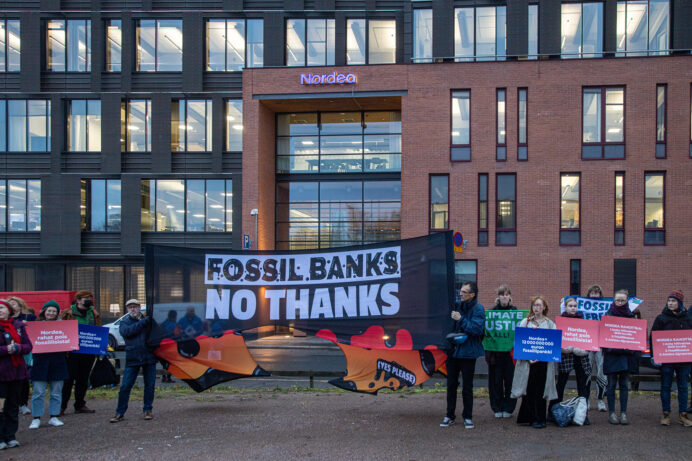After a number of reports, including Banking on Thin Ice and ShareAction’s Countdown to COP showed significant problems with Nordea’s guidelines for financing the fossil fuel sector, Nordea has developed a new policy. Nordea proudly announced that it is “increasing pressure on [the] fossil fuel sector” and the new policy indeed places stronger limitations on financing for the sector by the Nordic region’s largest bank. The policy still has serious gaps, however, which means that it will have limited effect on Nordea’s financing for some key heavy polluters like the Finnish coal company Fortum and companies exploring for more oil and gas in the Arctic. Despite IEA’s new Net Zero by 2050 report that there can be no more investments in new fossil fuels, the policy allows Nordea to continue to finance companies developing new oil and gas projects.
Nordea’s new restrictions
The new restrictions in Nordea’s fossil fuel policy include some important improvements, including new immediate restrictions and commitments to phase out financing for specific subsectors in the coming decade:
- No direct financing of new coal mines and new coal power plants.
- No financing of companies that plan to expand their coal power and mining activities.
- No financing of new or existing coal clients that derive more than 5% of their revenues from coal power or mining.
- No expansion of the financing amount for existing clients unless they adopt a plan to phase out coal by 2030 for industrialised countries (except in Germany and Russia) and 2040 globally.
- No financing of companies with over 5% revenue from Arctic drilling and a commitment to phase out existing financing for companies drilling in the northern parts of the Arctic by 2023.
- No financing of new clients with more than 5% revenues from unconventional oil and gas extraction (fracking and tar sands).
- No direct financing of unconventional oil and gas projects and associated pipelines.
- Phase out of all financing for companies active in unconventional fossil fuels extraction by 2026.
Loopholes
However, there are still several gaps in the policy that should be addressed:
- Nordea can keep financing companies that expand oil and gas, even though research like the IEA’s report Net Zero by 2050 finds there is no room for new fossil fuel supply in a 1.5°C pathway. Nordea’s new policy does not address this.
- The policy allows Nordea to keep financing coal companies in Germany until 2038. It argues this is in line with the German government’s national legislation to phase out coal¹. It is, however, clearly not in line with the requirements of the Paris Agreement, which requires a phase-out by 2030 in OECD countries. Nordea also makes an exception for coal in Russia, stating that it will set a target for Russia in 2022.
- Nordea can continue financing some of the largest coal companies globally because it only uses a 5% revenue threshold to identify companies for exclusion. For many companies with major coal activities in absolute terms, coal is only a small percentage of revenue because they are highly diversified. An example is Nordea’s existing client Fortum, which is one of Europe’s largest emitters but derives just over 4% of its turnover from coal. For electricity producers, Nordea should complement its 5% revenue threshold with a threshold based on the share of coal in a company’s electricity generation. It should also adopt an absolute exclusion threshold based on annual thermal coal production (10 million tons) and installed coal-fired capacity (5GW).
- Nordea says it will not expand financing to existing coal clients “unless the customer has a credible transition plan in line with the Paris Agreement”. This means Nordea can keep current levels of financing for existing coal clients, even for those that have not adopted proper transition plans. It also does not specify what it considers to be a credible transition plan, or when it will drop clients that do not meet its expectation.
- Nordea can continue financing Arctic drilling projects and the companies involved, including some of the largest companies that are currently exploring for more oil and gas reserves in the area like Lundin Energy, Aker BP and Var Energi. This is because although Nordea commits to phase out financing for Arctic drilling by 2023, it uses a very narrow definition of the Arctic region (the southernmost area covered by sea ice in summer) and only covers offshore, not onshore, drilling. In addition, Nordea can continue to finance new Arctic drilling projects and companies involved in exploration, as this does not lead to revenues until new reserves are found and the production has started. Nordea should therefore expand the policy to exclude all Arctic drilling projects and all companies involved in the expansion of Arctic oil and gas. This has become even more urgent given the recent announcement by the European Commission that it wants to end Arctic drilling, and will ban import of Arctic fossil fuels to the EU.
- The policy does not cover conventional oil and gas at all. LNG and offshore drilling are not mentioned, nor is infrastructure for conventional oil and gas.
- Nordea does not require oil and gas clients to phase out their activities in line with the Paris Agreement. It merely “recommends” companies adopt transition plans by 2022, but places no hard deadlines or requirements on customers.
- The policy is more generous when it comes to investments: it allows for investing in companies earning up to 10% of revenue from coal and unconventional oil and gas.
¹Media reports indicate a new SPD-lead German government coalition may change the coal phase out date to 2030 (see for example Bloomberg). Nordea has indicated it will update its policy when there are changes in national policy.

